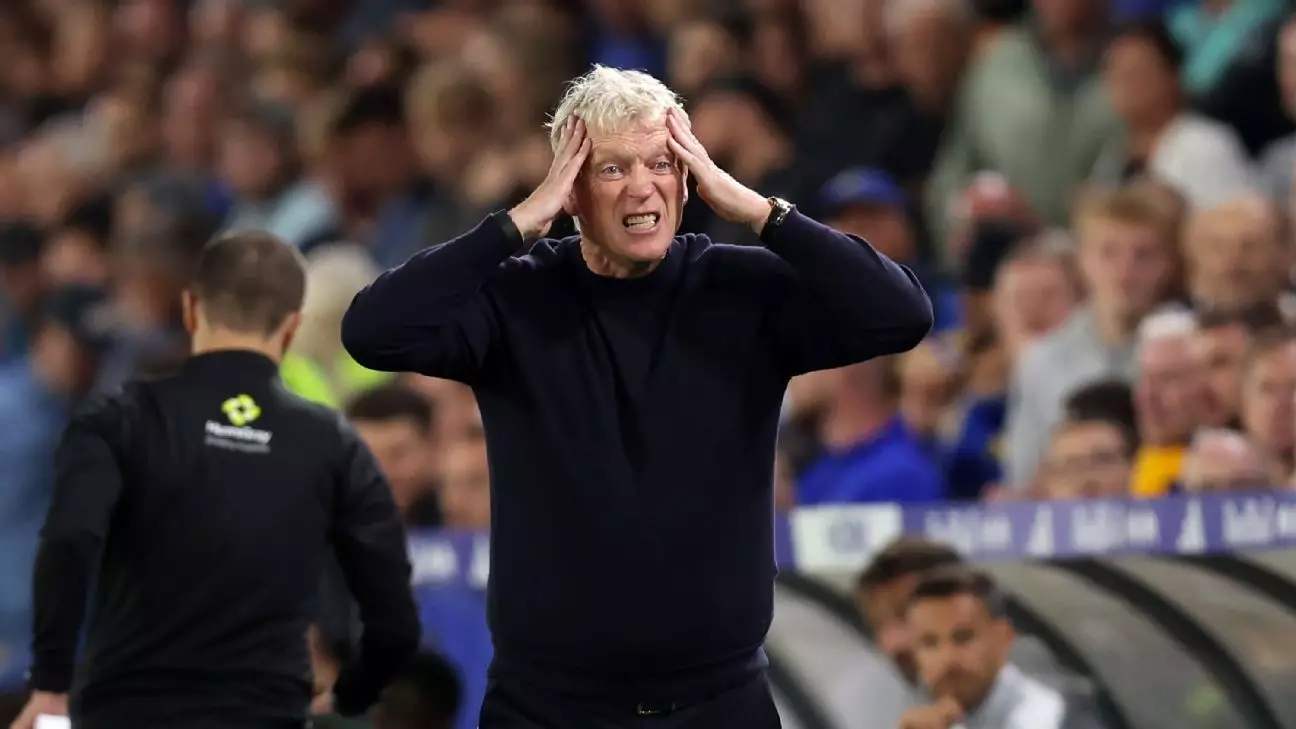The opening weekend of the Premier League once again highlighted the growing frustrations players, managers, and fans have with refereeing decisions. This season, the controversy surrounding a pivotal penalty in Everton’s match against Leeds United underscores a wider issue that undermines the integrity of the game. Everton’s boss, David Moyes, loudly voiced his disapproval, insisting that his team’s overall performance did not merit a point and condemning the decision to award a penalty as “poor” refereeing. Such sentiments are increasingly common in a league where VAR—and the decisions it influences—are often blamed for muddying the beautiful game’s transparency.
At the heart of the controversy was James Tarkowski’s seemingly innocuous challenge on Anton Stach. Despite Tarkowski’s arms being by his sides and the ball hitting his upper arm, referee Chris Kavanagh awarded a penalty, a decision upheld after VAR review. The implications of this call extended far beyond a single game; it raises a fundamental question about consistency and fairness in officiating. Moyes’s frustration was palpable, perceiving the decision as a poor reflection of referees’ performances this weekend—a sentiment that resonates with many who feel that VAR does not always deliver clear justice, often leaving fans and teams in a state of disbelief and anger.
Referees are ultimately human, and their mistakes can influence outcomes at the highest level, but the frequency and impact of questionable decisions put into question whether the system is fit for purpose. The Premier League’s reputation for high standards of officiating has been challenged repeatedly in recent seasons, and this weekend’s incidents serve as a stark reminder of the need for reform and consistency. As Moyes noted, the weekend’s refereeing decisions were collectively “poor,” emphasizing that such errors are not isolated incidents but part of a broader pattern eroding trust in the game’s governance.
Leeds and Nmecha: Triumph Through Resilience and Calm Under Pressure
Despite the controversy, the focus shifted to the players who managed to turn the tide and deliver thrilling moments on the pitch. Leeds United, newly promoted and brimming with energy, demonstrated a level of intensity that set the tone early in the match. Their manager, Daniel Farke, praised his side’s ferocity and commitment, which ultimately paid dividends when Lukas Nmecha confidently converted the decisive penalty in the 84th minute. Nmecha’s calmness was particularly impressive given his brief cameo appearance—just six minutes off the bench—highlighting his resilience and mental strength.
What makes Nmecha’s goal more compelling is his background. The German international has struggled with injuries in recent years, sidelining his promising career. His transformation into a confident penalty taker exemplifies perseverance, and his cool finish provided Leeds with a victorious start in their Premier League return. Farke’s decision to keep Nmecha in the squad and trust him with the crucial moment speaks volumes about the value of patience and faith in players who have faced adversity. It also underscores Leeds’ strategic depth and willingness to nurture talent despite past setbacks.
Furthermore, Nmecha’s performance challenges traditional narratives about players who recover from injuries and go under the radar. His journey from Bundesliga struggles to Premier League limelight proves that resilience and mental fortitude are just as vital as physical attributes. His performance shouldn’t just be seen as a single goal but as a testament to the importance of trusting your squad and staying composed under pressure—qualities that could define Leeds’s campaign this season.
Looking Ahead: New Stadiums and Big Fixtures Set the Tone
The upcoming fixtures and infrastructural developments signify the league’s ongoing evolution. Everton’s move into their brand-new Bramley-Moore Dock stadium marks a new chapter not only for the club but also for the Premier League’s expansion. Hosting Brighton on August 24, Everton will test their new home in front of what promises to be an electrifying atmosphere. Meanwhile, Leeds faces a challenging trip to Arsenal, emphasizing the importance of resilience and tactical discipline early in the season.
The first matchday of each season is more than just a series of fixtures; it’s a reflection of the league’s competitive spirit, its pitfalls, and its triumphs. Controversies off the pitch often threaten to overshadow the beautiful moments on it, but fans and clubs alike know that gritty performances and unwavering resolve forge long-term legacies. This weekend’s events—marked by debate, drama, and determination—serve as a microcosm of the Premier League itself: unpredictable, emotionally charged, and always compelling.
As the season unfolds, it will be interesting to see how teams adapt to the challenges laid out by officiating controversies and the opportunities presented by new stadiums and rising talent. The narrative is far from over, but one thing remains clear: football’s true essence lies in the passion it ignites, often despite the errors, rather than because of them.

